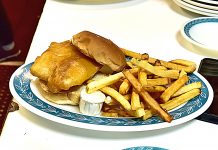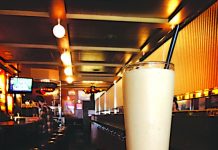
For a city just now emerging from harsh economic times, Detroit has had one luxury that has continuously spoiled it rotten: Middle Eastern food, which is better and more plentiful here than almost anywhere in the country.
We have an abundance of restaurants offering culinary variances on what we collectively think of as Middle Eastern: Lebanese, Syrian, Turkish, Egyptian, Jordanian, Iraqi, Yemeni, and their cousin North African countries.
Middle Eastern food is to Detroit what Italian food is to New York, Chinese is in San Francisco, seafood is to Boston, and Creole is in New Orleans. It’s neighborhood food. It’s healthful, inexpensive, and tremendously flavorful.
Most Middle Eastern eateries are relatively simple places, purely about the food. But Elie’s Mediterranean Grill and Bar in downtown Birmingham is a far more glamorous, upscale version in the heart of that city’s trendy restaurant district.
Across the last two decades, Middle Eastern dining has moved from being an obscure and exotic kind of eating, to replace Greek food as metro Detroiters’ go-to convenience midweek ethnic dining.
Middle Eastern migrations to this area followed the same basic pattern of previous nationalities, as they came to the motor capital of America. Some fled war and oppression, particularly from Lebanon and Iraq. Others came to escape poverty. And like the Italians, Czechs, and Hungarians before them, they found a good living running small stores, gas stations, and little restaurants. It’s all very Detroit.
Elie’s is entertainment, along with good food.
An ample outdoor terrace covered by a huge retractable awning, under which rows of tables surrounded by potted palms and flower boxes front Pierce Street, gives Elie’s a very Cannes or Nice promenade café ambience.
The restaurant is casual and welcoming, and it attracts an impressive crowd: chiseled guys in three-button dark suits and an extra dab of hair product, women in slinky open-backed summer dresses, suntans, and oil-shined legs.
Compared to most of Birmingham’s other new dining spots of the last three or four years, Elie’s is an old hand with a new face-lift worthy of some of its patrons.


It was launched 19 years ago as a simple juice bar that served traditional Lebanese fare: hummus, tabbouli, grape leaves, and various shawarma and kafta meat dishes and sandwiches.
Four years ago, Birmingham changed its regulations, giving a new kind of liquor license to a specific type of restaurants. The so-called “bistro” license is limited to places that have 65 seats or fewer, a fully operating kitchen, and seasonal seating, such as a patio or a terrace.
At the time, owners Elie and Tracy Mondalek, already 15 years into their little place, saw an opportunity in the revised rules. So, they applied for and received one of Birmingham’s first Class-C bistro licenses.
Effectively, they were the very tip of the trend that mushroomed into the Detroit area’s most recent, biggest, and best destination-dining area to emerge in decades.
When they closed to renovate in 2007, the Mondaleks hired master restaurant designer Ron Rea to give them something different. Their timing seemed terrible. A bad local economy had hit, then came the housing bust and bank failures.
“We opened in April 2008, just when the economy went down,” Elie says. But while other restaurants struggled, Elie’s seemed immune and rode the crest of that wave from the very start.
“We didn’t want it to be a standard Middle Eastern place,” Elie says. “We liked the French and the Italian Mediterranean look and feel.” They picked an azure hue for the exterior and added little touches of Lebanon, such as string curtains and single chandelier crystal pendants hanging here and there as accents.
“It has been great,” Elie says. “We’re really blessed. We didn’t get hit when everything turned down.” He attributes the success to the newness of Elie’s at the time, and the high-quality food and prices, which are a little lower than comparable places.
The front patio opens to the street and sports a fully raised garage door façade for summer dining, which brings the outdoors in and also spills patrons to outside tables. A full bar was added, and tony wood and glass dividers and blue upholstered banquettes give it a newer, sleeker feel.
The walls are flanked by large spotlighted sepia photograph murals depicting Beirut in the era when it was known as the Paris of the Middle East — a time before a long, devastating civil war obliterated much of its beauty.
There’s also originality to the food. It’s got a lot of the expected Lebanese fare, well-prepared dishes, such as chunks of lamb and chicken shawarma marinated and grilled; shish kafta, which is spiced ground lamb; and the Middle Eastern version of steak tartare made of raw ground lamb, called kibbee niyeh.
Hummus and baba ganoush are served with puffy hot pita bread fresh from a corner clay oven.
Elie’s also takes a step forward from the traditional with several other dishes.

It rounds the coast toward Spain with a fascinating gazpacho — the cold vegetable soup that originated in Andalusia — that has all the traditional ingredients that are normally either chunk-cut or blender chopped. Here, however, the gazpacho has been emulsified into a creamy, smooth lightly harissa-tasting delicate cold soup with the texture of vichyssoise. But it works.
The menu also has an assortment of decidedly non-Lebanese items, such as jumbo prawns sautéed in coriander, garlic, and tomato; Moroccan-spice swordfish with grilled vegetables and harissa, the spicy reddish paste; a very northern European salmon plate with potato latkes, onion, capers, and sour cream; a lake-perch dish in which the fish is sautéed Provençal style with garlic, scallion, tomatoes, and parsley in white wine; a pistachio crusted whitefish in an orange tahini.
The take-away from Elie’s is this: Purists would say that there are other places that offer better examples of Middle Eastern food. That might be true, but judging Elie’s in a broader context, what’s exceptional here is the manner in which the whole package fits together; the charm, the feel, the very good food, the little touches of culinary innovation that make it a very big cut above others, and a fun evening of dining.
263 Pierce St., Birmingham; 248-647-2420, eliegrill.com. L&D daily.
Cook is Hour Detroit’s chief restaurant critic. E-mail: editorial@hour-media.com.
|
|
|









